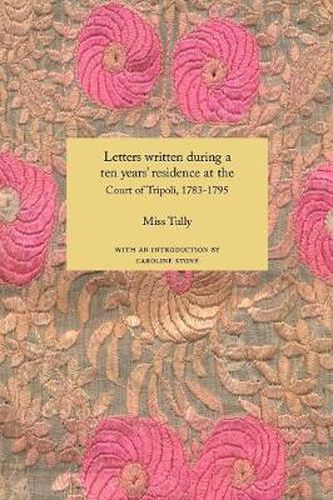Readings Newsletter
Become a Readings Member to make your shopping experience even easier.
Sign in or sign up for free!
You’re not far away from qualifying for FREE standard shipping within Australia
You’ve qualified for FREE standard shipping within Australia
The cart is loading…






This title is printed to order. This book may have been self-published. If so, we cannot guarantee the quality of the content. In the main most books will have gone through the editing process however some may not. We therefore suggest that you be aware of this before ordering this book. If in doubt check either the author or publisher’s details as we are unable to accept any returns unless they are faulty. Please contact us if you have any questions.
Miss Tully’s Letters form a clear and eminently readable narrative of her years in Tripoli and the political situation there in the late 18th c, as well as a unique account of relationships within the harem of the ruler. She and her nieces had free access to the women of the family of the Bashaw (Pasha) and an intimate relationship developed. The Preface to the first edition of 1816, tells us that Miss Tully’s nieces had spoken Arabic all their lives, and she herself clearly learned some, but it would still be fascinating to know whether this was the only common language of the harem or whether they also made use of the lingua franca in use at the time. The ruler’s wife was a Georgian, his favourite was a local, presumably Arabic-speaking, Jewish woman, his daughters were married to renegade south Italians and the other inmates of the harem were of European, Circassian and possibly Berber origin, together with numerous Africans from various points south of the Sahara. Not much is known of the Tully family and a summary of the little available background is given below. The following notes attempt to provide a historical context for some of the main issues mentioned by Miss Tully: nomad raids, piracy, slaving and famine had been problems on and off for a couple of thousand years. Miss Tully sets down the story of the bitter quarrels among the young Karamanli brothers and their conclusion has been added for the sake of completeness and because of its broader historical interest. The period between the writing of the letters and their publication saw major changes in Europe, among them the French Revolution, the Napoleonic Wars and the abolition of slavery; optimism and the hope of political advance was in the air. The words of the 1816 Preface, explaining why Miss Tully’s view of Tripoli is of particular interest, seem to echo a very modern preoccupation: ..“.the expectation of seeing there a nearer approximation to the enlightened principles of other nations, with regard to the personal rights and liberties of mankind…..”
$9.00 standard shipping within Australia
FREE standard shipping within Australia for orders over $100.00
Express & International shipping calculated at checkout
This title is printed to order. This book may have been self-published. If so, we cannot guarantee the quality of the content. In the main most books will have gone through the editing process however some may not. We therefore suggest that you be aware of this before ordering this book. If in doubt check either the author or publisher’s details as we are unable to accept any returns unless they are faulty. Please contact us if you have any questions.
Miss Tully’s Letters form a clear and eminently readable narrative of her years in Tripoli and the political situation there in the late 18th c, as well as a unique account of relationships within the harem of the ruler. She and her nieces had free access to the women of the family of the Bashaw (Pasha) and an intimate relationship developed. The Preface to the first edition of 1816, tells us that Miss Tully’s nieces had spoken Arabic all their lives, and she herself clearly learned some, but it would still be fascinating to know whether this was the only common language of the harem or whether they also made use of the lingua franca in use at the time. The ruler’s wife was a Georgian, his favourite was a local, presumably Arabic-speaking, Jewish woman, his daughters were married to renegade south Italians and the other inmates of the harem were of European, Circassian and possibly Berber origin, together with numerous Africans from various points south of the Sahara. Not much is known of the Tully family and a summary of the little available background is given below. The following notes attempt to provide a historical context for some of the main issues mentioned by Miss Tully: nomad raids, piracy, slaving and famine had been problems on and off for a couple of thousand years. Miss Tully sets down the story of the bitter quarrels among the young Karamanli brothers and their conclusion has been added for the sake of completeness and because of its broader historical interest. The period between the writing of the letters and their publication saw major changes in Europe, among them the French Revolution, the Napoleonic Wars and the abolition of slavery; optimism and the hope of political advance was in the air. The words of the 1816 Preface, explaining why Miss Tully’s view of Tripoli is of particular interest, seem to echo a very modern preoccupation: ..“.the expectation of seeing there a nearer approximation to the enlightened principles of other nations, with regard to the personal rights and liberties of mankind…..”